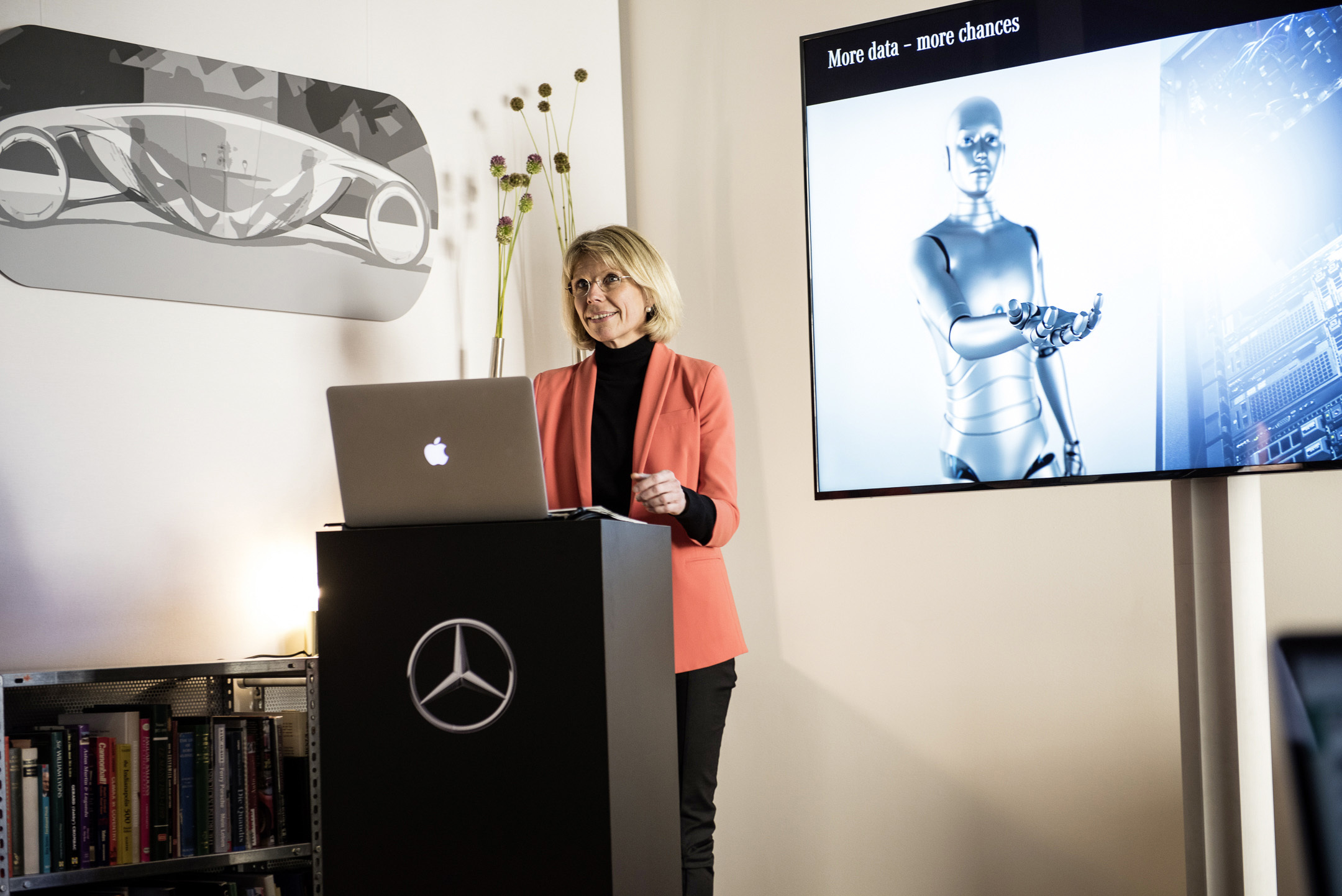
Mercedes research boss prioritises artificial intelligence
Daimler – the parent company of Mercedes-Benz – is placing artificial intelligence at the centre of its plans going forward, says its head of research, Anke Kleinshmit, at the company’s Future Talk conference
How is artificial intelligence influencing tomorrow’s mobility? How can we use its ideas today? How intelligent will the car of the future be? And above all: what role will people play in this?
These were the central questions discussed by Mercedes-Benz experts at the fourth Future Talk in Berlin in dialogue with scientists, engineers and journalists. In the past few years the Mercedes-Benz Future Talk has dealt with the subjects of utopia, robotics and virtuality. This time, the focus was on the integration of artificial intelligence in the field of mobility and the interaction of humans and machines.
Already in the 1960s researchers expected a major breakthrough in the development and application of artificial intelligence, but the human world still proved too complex for digital computers. However, due to the triumph of the internet, the mass of data that has become available with this and the huge increase in computing power of today’s computers, artificial intelligence is now entering people’s lives and also offers big opportunities and potential for the future of the automobile.

“Artificial intelligence is a key future topic for Mercedes-Benz, in-car and beyond, such as in the fields of mobility services or in development and production,” says Anke Kleinschmit, head of Daimler Group Research. “Artificial intelligence has ceased to be science fiction and the progress in autonomous driving is an impressive proof of this. Likewise, AI already assists the development phase and production by providing intuitive access to global knowledge and knowhow – Always tailored to the individual needs, experiences and knowledge of the employee.”
Opportunities and limits of AI
In addition to the technical development and data security, a basic prerequisite for the sustained success of artificial intelligence in all application cases is the acceptance by society and consumers.
“Artificial intelligence will only be successful on a long-term basis if we succeed in building up trust between man and machine,” says futurologist Alexander Mankowsky. “We must define the division of tasks between human and artificial intelligence.”
A necessary prerequisite is also to be aware of what artificial intelligence is able to do and what it isn’t. Because ultimately it always needs human participation and is based on human development. But it can support to make and examine decisions and therefore reach optimal results in a shorter space of time. The philosophy of Mercedes-Benz is – always to put human being at the centre of all activities.
Cognitive vehicles: the car as a control centre for individualised AI
An important objective of Mercedes-Benz’ activities relating to artificial intelligence is the development of cognitive vehicles. They are not only able to respond to certain situations; they even have enough knowledge about their environment to be able to act autonomously on this basis. Coupled with corresponding services they could become the fundament for a holistic mobility eco-system of the future.
For example, they could autonomously analyse the current traffic situation for all forms of transport and draw up an individual mobility plan that suits the customer’s personal daily routine and mood. In addition, household robots and delivery drones could be linked to the system with the cognitive car as the control centre for this.
Unlike smartphones and wearables, the car would surround the person and become a surrounding for a digital experience. It could analyse the driver’s behaviour, interpret needs and adapt accordingly. It would be able to identify what he or she wants in certain situations and what he or she needs.
Examples of this are playing the right music to suit the current mood, setting the most pleasant temperature or developing services relating to health and safety. Moreover, the cognitive vehicle would offer self-determined access to an individualised artificial intelligence which supports human beings, entertains them and could even challenge them intellectually.
Image and pattern recognition as an important milestone on the way to autonomous driving
To successfully embark on this path, vehicles must be able to acquire knowledge about their environment as well as analyse it. This machine learning already plays an important role for autonomous driving as of today.
Mercedes-Benz is working intensively on the further optimisation of automatic image and pattern recognition for driver assistance systems and autonomously driving vehicles. A decisive topic here is the interaction of cameras, sensors and the associated computing units.
The system breaks down the pictures of road scenes into abstract segments with coloured marking. In this way it identifies buildings, vehicles, persons, trees and pavements among other things and reliably finds traffic lights as well as smaller dangerous obstructions on the road. Based on this, the autonomous vehicle analyses the traffic situation, predicts the behaviour of other road users and decides on its own behaviour.
“In daylight many systems for image and pattern recognition, on the market are reliable,” says Dr Uwe Franke, responsible for image recognition/signal processing and sensor fusion in the Mercedes-Benz development department. “Meanwhile, our system even offers top level results at night and that is a major development. The next step is about recognising and interpreting people’s gestures and facial expressions.”
It is the recognition of gestures, facial expressions and people’s understanding of machine behaviour that makes an operative interaction between man and autonomous vehicles possible at all. On this basis trust can be created between humans and machines. Vehicles must be able to make it clear that they recognise pedestrians and pay attention to them. Pedestrians must receive information about where an autonomous vehicle is going, how it will behave in the next few moments and how they should behave themselves.
Finding and making faster use of ideas and potential with AI
Mercedes-Benz is not just using artificial intelligence with regard to its vehicles. Among other things the company is testing self-learning systems in the observation of technology trends, in the interpretation of development and test data as well as for the industrial maintenance of its production and manufacturing facilities.
Artificial intelligence can make a decisive contribution to diagnosing technical problems. For example, until now production maintenance staff either had to search through huge amounts of documents or fall back on their personal experience to get information about machine defects.
The tested system handles documentation with natural language processing and serves as a semantic search engine. Unlike a keyword-based search engine the focus is on the meaning of the request. This enables requests in the form of various fault descriptions, for example “oil is leaking” or “leaking pipes”. In this way repair and maintenance processes can be speeded up and made more efficient.
Mercedes-Benz to work with a leading AI institute in future
Mercedes-Benz works with numerous renowned research institutions in the field of artificial intelligence. For years Daimler has been expanding its network to universities with innovative instruments such as “Forschungscampus”, tech centres, shared professorships and industry fellowships and start-up incubators and accelerators.
In addition, the company will become a new member of the MIT CSAIL Alliance Program in the near future. With 50 research groups and around 1000 members of staff, the Computer Science and Artificial Intelligence Laboratory (CSAIL) of the Massachusetts Institute of Technology (MIT) is one of the leading institutes worldwide in the field of IT and AI.
Kleinschmit says: “Mercedes-Benz is rigorously advancing its research and development in different directions so as to continue to play a pioneering role in the automotive industry in the development and application of artificial intelligence.
“The new cooperation with the MIT ideally complements this. The partnership enables us to benefit even more directly from the research results of a leading world institute and to network with the best brains.
“We aim to continue to play a leading role in shaping the future of mobility – with new mobility concepts, with cognitive cars and services which focus on people and make their daily lives easier and better.”
Mercedes-Benz Future Talk – Shaping the future together
As well as Kleinschmit, and Franke, the Daimler employees participating in this year’s round table discussion were futurologist Alexander Mankowsky, and Patrick Klingler from IT Innovation Management. The external experts included Dr Miguel Nicolelis, Duke Center for Neuroengineering and Professor Jürgen Schmidhuber, IDISIA Swiss Research Institute for Artificial Intelligence.
Future Talk participant Prof Schmidhuber sees numerous fields of application for artificial intelligence in future. “It will take decades at most rather than centuries for us to develop true artificial intelligence. Artificial intelligences will learn almost everything that people can do – and much more besides. Their possibilities for shaping the future, are really only limited by our imagination.”
Also Dr Miguel Nicolelis is convinced: “Artificial intelligence can lead to some sort of machine intelligence. This can be helpful in the future if it is under the control of human intelligence, not the other way around.”
The Future Talk is a dialogue format successfully established by Mercedes-Benz in 2013. By exchanging ideas with vanguards from various disciplines, the brand shares its visions and, as the inventor of the automobile, demonstrates its expertise in shaping a desirable, mobile future. The focus topics to date are representative of the variety of this meta topic.
This year’s Future Talk continues the discussion of the last few years on the subjects of “Utopias” (2013), “Robotics” (2014) and “Virtuality” (2015).
